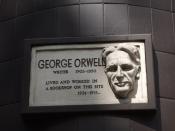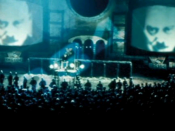The ability to interpret symbolism has always been essential for a full understanding of George OrwellÃÂs works of literature, and this is certainly true of 1984, which is a novel written as a political message to warn future generations about the dangers of totalitarian societies. Orwell directly conveys the message through various themes, and uses powerful symbols to give these themes greater significance. A number of small symbols throughout the novel have large importance to the main ideas. The paperweight assists the portrayal of WinstonÃÂs desire to remember the true past, Newspeak further enhances the theme of language and its role in the PartyÃÂs control over its population, and telescreens provide a direct connection to the theme of psychological and physical control by the Party. Although these symbols seem unrelated, they are closely connected with each other, representing the totalitarianism that conflicts with personal freedom.
The paperweight symbolizes WinstonÃÂs desire to remember the past and his will to love freely out of the grasp of the Party, thus enhancing the theme of the PartyÃÂs control of information and history.
Winston buys a paperweight in an antique store in the proletarian district. Orwell writes: ÃÂIt is a little chunk of history that they have forgotten to alter.ÃÂ This quote implies that the paperweight represents WinstonÃÂs desire to make a connection with past, not the PartyÃÂs version of the truth that has replaced individualsÃÂ memories. Orwell incorporates this symbol as an object of the past that excites WinstonÃÂs feelings. ÃÂThe paperweight was the room he was in, and the coral was JuliaÃÂs life and his own, fixed in a sort of eternity at the hart of the crystal.ÃÂ This is when the secondary symbol of the paperweight, which is the relationship between Winston and Julia, is introduced. However, the fact that the paperweight is made out of glass reflects the fragility of WinstonÃÂs ambitions and his relationship with Julia, foreshadowing destruction. This becomes a reality when both Julia and Winston betray each other once they are captured by the Thought Police. When the Thought Police eventually arrest Winston, the paperweight shatters on the floor. ÃÂSomeone had picked up the glass paperweight from the table and smashed it to pieces on the heath stone. The fragment of coral, a tiny crinkle of pink like a sugar rosebud from a cake, rolled across the mat. How small, thought Winston, how small it always was!ÃÂ (223) This quote is significant to the novel as a whole, for it represents the end of WinstonÃÂs attempt to remember the past, and more importantly, the end of his relationship with Julia. Moreover, the shattering of the paperweight is a representation of the destruction of Winston and JuliaÃÂs uniqueness in thinking different from everyone else. Therefore, the symbol conveys the theme of indestructible totalitarianism.
Newspeak symbolizes a tool for thought control, which underscores the idea of language as mind control, and on a larger scale it assists the political theme of dangers of totalitarianism. ÃÂDonÃÂt you see that the whole aim of Newspeak is to narrow the range of thought? In the end we shall make thought crime literally impossible, because there will be no words in which to express it.ÃÂ (52) As Syme states, Newspeak reduces and limits the number of words in the English language, and removes words used to describe rebellion or independence. This quote holds a great amount of significance to the novel, because one of the most important messages in 1984 is that language is of central importance to human thought, because it structures and limits the ideas that individuals are capable of formulating and expressing. In the appendix, it states: ÃÂThe purpose of Newspeak was not only to provide a medium of expression for the world-view and mental habits proper to the devotees of Ingsoc, but to make all other modes of thought impossible.ÃÂ Thus, Newpeak ties with the message that language is used as another mechanism of mind control. The Party is constantly refining and perfecting Newspeak, with the ultimate goal that no one will be capable of conceptualizing anything that might question the PartyÃÂs absolute power.
The themes of physical control and absence of freedom are also depicted through telescreens that are omnipresent. They are the novelÃÂs most visible symbol of the PartyÃÂs constant monitoring and are utilized to represent the governmentÃÂs mass authority over the population in Oceania. It also symbolizes the abused technology by the totalitarian government for its own needs. By means of telescreens hidden across the city, the Party is able to monitor its members almost all of the time for any crimes committed against the government. Hence, the telescreens also emphasize the theme of physical control. The Party controls the bodies of its subjects through constantly watching for any sign of disloyalty, to the point that, as Winston observes: ÃÂa tiny facial twitch could lead to an arrest.ÃÂ It uses advanced methods of technology to control oneÃÂs every move. ÃÂThey could do nothing except stand gazing into one anotherÃÂs eyes. To run for life, to get out of the house before it was too lateÃÂno such thing occurred to them. Unthinkable to disobey the iron voice from the wall. There was a snap as though a catch had been turned back, and a crash of breaking glass. The picture had fallen to the floor, uncovering the telescreens from behind it.ÃÂ (221) Before this moment, Winston and Julia believed the room above Mr. CharringtonÃÂs shop was a safe place to enjoy freedom. However, it is shown that the telescreens are inescapable object that oppress the liberty of individuals. Evidently, Orwell uses them to warn his readers about the unlimited power imposed by the tyrannical government on its citizens, through gaining mental and physical control over its people.
It is possible to conclude that Orwell skillfully joined the symbols together for the ultimate goal of conveying the message on the threat of dictatorship. Indeed, the political messages are well established through the novel by utilizing effective symbols. The paperweight, Newspeak and telescreens played significant roles in underscoring the dangers of totalitarian societies that deserve the readersÃÂ attention, for these symbols make 1984 a chilling account of how authority and dictatorship can kill the integrity and freedom.
Bibliography:www.sparknotes.com/lit/1984/themes.html





